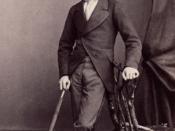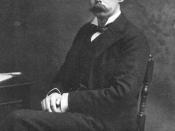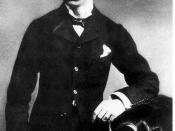During the first term of 1884 young Winston finally exhibited an improved performance at St. George's School. His Division Master was "more satisfied with him than I have ever been," but cautioned that there was still much room for improvement. His Head Master commented that perhaps Winston was "beginning to realize that school means work and discipline," but complained that Winston was "rathe.r greedy at meals." Many years later WSC's son and biographer defended his father's culinary behavior with some rather caustic judgments of the food at English public (private) schools.
Meanwhile, Lord Randolph Churchill's withdrawal from public life proved unpermanent. At Blenheim he plotted an attack on the Central Committee of the Conservative Party formed chiefly, according to WSC, "of members of the Carlton Club." The first step was to gain control of the Council of the National Union of Conservative Associations. But Lord Randolph maintained cordial relations with Lord Salisbury and Sir Stafford Northcote, the Conservative leaders in the Lords and Commons respectively, and concentrated his attacks on Liberal leader William Gladstone.
The most famous occasion was the "chips speech," alluding to Gladstone's hobby of cutting trees, leaving only wooden chips: "To all who leaned upon Mr. Gladstone, who trusted in him, and who hoped for something from him -- chips, nothing but chips -- hard, dry, unnourishing, indigestible chips!"
SPRING 1884 (AGE 9)
A few days after the 'chips' speech, Lord Randolph announced that he would carry the banner of Tory Democracy in the next general election in Birmingham --the bastion of Liberal radicals John Bright and Joseph Chamberlain. The entire country, including St. George's School, was abuzz with the challenge. Winston wrote his mother: "Mrs. Kynnersley went to Birmingham this week. And she heard that they were betting two to one that Papa would get...


